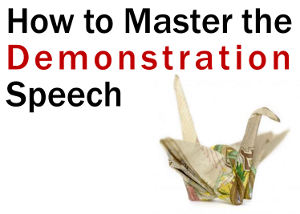| Home » Articles » Speech Writing |
| Entries in category: 20 Shown entries: 11-20 |
Pages: « 1 2 |
Sort by: Date · Name · Rating · Comments · Views
|
What about you? Do you have charisma? Many speakers and non-speakers hold the belief that charisma is an innate gift — either you are born with it, or you aren’t. But can you learn charisma? Recent research suggests that you can! |
|
You are certainly aware of this technique, but are you aware that you can use a rhetorical question in at least nine different ways? No? Read on! This article identifies nine ways to use rhetorical questions, and provides examples throughout. |
|
One way to breathe life into your speeches is to craft memorable phrases that will linger on the lips of your audience, and a great tool to help you achieve this goal is chiasmus. In this article, we define what chiasmus is, study several famous (and not-so-famous) chiasmus examples, and give some tips for crafting chiasmus into your own speeches. |
|
Demo speeches are ubiquitous. They are assigned to students in high school and college. They are a staple in corporate and other adult training environments. They are among the most common speeches given in Toastmaster clubs. Due to the popularity of this speech form, the well-rounded speaker must master the demonstration speech. Despite this, many speakers don’t know the basics to delivering an effective demonstration speech. Do you? In this article, we present a demonstration speech outline which gives the best chance for success, and discuss the necessary elements for a great demo speech. |
|
This begs the question — how do you capitalize on your audience analysis? That is, how do you reap the benefits to offset the time that you invested? In this article, we examine how to improve your presentation based on your audience analysis. |
|
One of the most important writing techniques I ever learned was parallelism. Parallelism leads to clear writing, and clear writing leads to clear speaking. In this article, we define parallelism, study numerous examples, and discuss how you can incorporate it into your speeches. |
|
If you’ve experienced this, there’s a very good chance that the speaker failed to use appropriate speech transitions. In this article, we define speech transitions and learn why they are so critical. In addition, we provide dozens of speech transition examples that you can incorporate into your speech. |
|
Yet many speakers miss a fantastic opportunity with a call-to-action that is wishy-washy, hypothetical, or ill-constructed. Even worse, some speakers omit the call-to-action entirely. A poor call-to-action undermines the effectiveness of your speech; a great call-to-action stirs your audience to act enthusiastically. In this article, we reveal the qualities of a strong speech call-to-action which will lead your audience to act. |
|
“Experience without theory is blind, but theory without experience is mere intellectual play.”
Both of these speakers fail because they don’t understand the ladder of abstraction. In this article, we define the ladder of abstraction, give several examples, and explore why it is important for all speakers. Then, we explore specific strategies that you can apply to improve the balance and understanding in your presentations. |
|
As I breezed through Writing Tools, I confessed to my wife that I felt inspired to write. Thus, the book achieved the rare feat of delivering on the promise of the front cover review (from the Boston Globe): “Writers will be inspired to pick up their pens.” |









